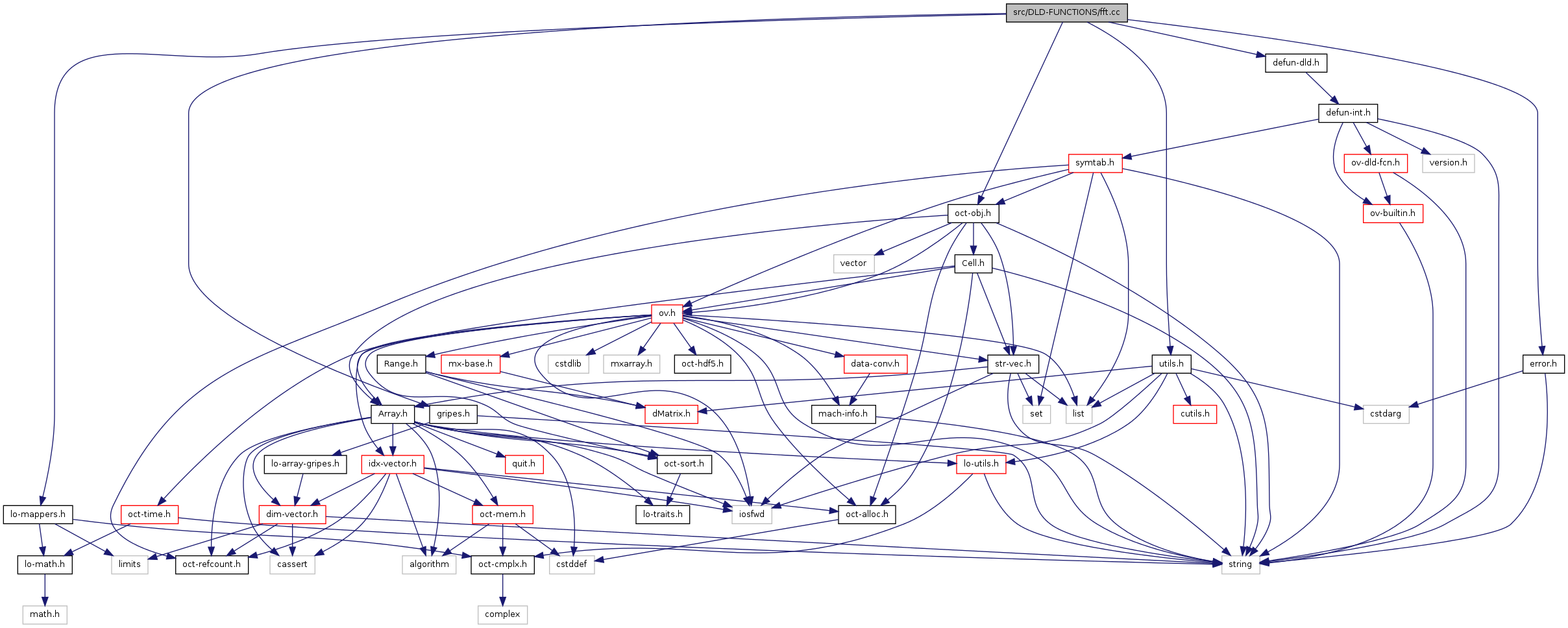#include "lo-mappers.h"#include "defun-dld.h"#include "error.h"#include "gripes.h"#include "oct-obj.h"#include "utils.h"
Go to the source code of this file.
Defines | |
| #define | FFTSRC "@sc{fftpack}" |
Functions | |
| DEFUN_DLD (fft, args,,"-*- texinfo -*-\n\ @deftypefn {Loadable Function} {} fft (@var{x})\n\ @deftypefnx {Loadable Function} {} fft (@var{x}, @var{n})\n\ @deftypefnx {Loadable Function} {} fft (@var{x}, @var{n}, @var{dim})\n\ Compute the discrete Fourier transform of @var{A} using\n\ a Fast Fourier Transform (FFT) algorithm.\n\ \n\ The FFT is calculated along the first non-singleton dimension of the\n\ array. Thus if @var{x} is a matrix, @code{fft (@var{x})} computes the\n\ FFT for each column of @var{x}.\n\ \n\ If called with two arguments, @var{n} is expected to be an integer\n\ specifying the number of elements of @var{x} to use, or an empty\n\ matrix to specify that its value should be ignored. If @var{n} is\n\ larger than the dimension along which the FFT is calculated, then\n\ @var{x} is resized and padded with zeros. Otherwise, if @var{n} is\n\ smaller than the dimension along which the FFT is calculated, then\n\ @var{x} is truncated.\n\ \n\ If called with three arguments, @var{dim} is an integer specifying the\n\ dimension of the matrix along which the FFT is performed\n\ @seealso{ifft, fft2, fftn, fftw}\n\ @end deftypefn") | |
| DEFUN_DLD (ifft, args,,"-*- texinfo -*-\n\ @deftypefn {Loadable Function} {} ifft (@var{x})\n\ @deftypefnx {Loadable Function} {} ifft (@var{x}, @var{n})\n\ @deftypefnx {Loadable Function} {} ifft (@var{x}, @var{n}, @var{dim})\n\ Compute the inverse discrete Fourier transform of @var{A}\n\ using a Fast Fourier Transform (FFT) algorithm.\n\ \n\ The inverse FFT is calculated along the first non-singleton dimension\n\ of the array. Thus if @var{x} is a matrix, @code{fft (@var{x})} computes\n\ the inverse FFT for each column of @var{x}.\n\ \n\ If called with two arguments, @var{n} is expected to be an integer\n\ specifying the number of elements of @var{x} to use, or an empty\n\ matrix to specify that its value should be ignored. If @var{n} is\n\ larger than the dimension along which the inverse FFT is calculated, then\n\ @var{x} is resized and padded with zeros. Otherwise, if @var{n} is\n\ smaller than the dimension along which the inverse FFT is calculated,\n\ then @var{x} is truncated.\n\ \n\ If called with three arguments, @var{dim} is an integer specifying the\n\ dimension of the matrix along which the inverse FFT is performed\n\ @seealso{fft, ifft2, ifftn, fftw}\n\ @end deftypefn") | |
| static octave_value | do_fft (const octave_value_list &args, const char *fcn, int type) |
| static octave_value do_fft | ( | const octave_value_list & | args, | |
| const char * | fcn, | |||
| int | type | |||
| ) | [static] |
Definition at line 43 of file fft.cc.
References dim_vector::any_zero(), arg(), octave_value::array_value(), octave_value::complex_array_value(), octave_value::dims(), error(), error_state, octave_value::float_array_value(), octave_value::float_complex_array_value(), ComplexNDArray::fourier(), NDArray::fourier(), FloatComplexNDArray::fourier(), FloatNDArray::fourier(), gripe_wrong_type_arg(), ComplexNDArray::ifourier(), NDArray::ifourier(), FloatComplexNDArray::ifourier(), FloatNDArray::ifourier(), octave_value::is_complex_type(), octave_value::is_real_type(), octave_value::is_single_type(), dim_vector::length(), octave_value_list::length(), NINT(), NINTbig(), octave_value(), print_usage(), Array< T >::resize(), and xisnan().
Referenced by DEFUN_DLD().
 1.7.1
1.7.1